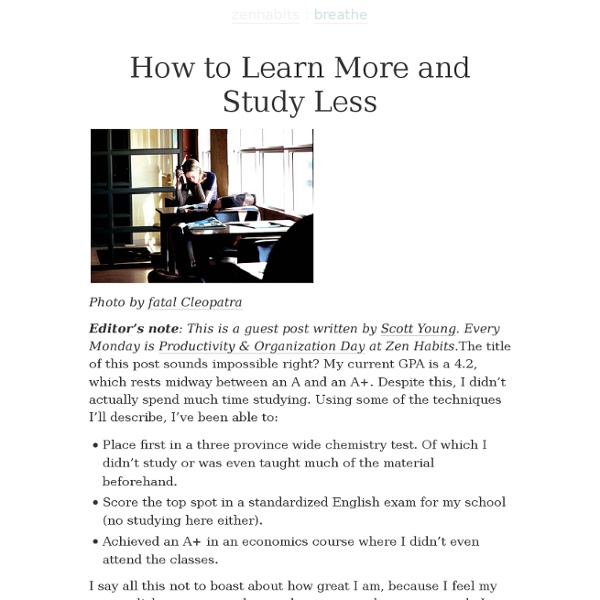



http://zenhabits.net/how-to-learn-more-and-study-less/
Get Anyone to Like You – Instantly – Guaranteed Get anyone to like you - Instantly - Guaranteed If you want people to like you, make them feel good about themselves. This golden rule of friendship works every time - guaranteed! Method of loci The method of loci (loci being Latin for "places") is a method of memory enhancement which uses visualizations with the use of spatial memory, familiar information about one's environment, to quickly and efficiently recall information. The method of loci is also known as the memory journey, memory palace, or mind palace technique. This method is a mnemonic device adopted in ancient Roman and Greek rhetorical treatises (in the anonymous Rhetorica ad Herennium, Cicero's De Oratore, and Quintilian's Institutio Oratoria).
5 Education Hacks - How To Refuel Your Brain Without Any Excuses ← LMLRN How To Get A Degree Education, Learn A New Language, Teach Your Children Calculus, and Read Thousands of Books for Free Long gone are the days of Encarta Thesaurus and the Encyclopedia Britannica. Wikipedia has all but obliterated the need for a hard copy of any information. The Internet has changed the face of education and the new generation are going through school with an unprecedented amount of information at their fingertips. There are so many reasons NOT to study such as: Price, Location and Time.
How to Fight Information Overload Information overload is a creature that has been growing on the Internet’s back since its beginnings. The bigger the Internet gets, the more information there is. The more quality information we see, the more we want to consume it. The more we want to consume it, the more overloaded we feel. Fake it Till You Make it: 10 Ways to Feel Confident (Even When You Aren’t) “Original Fake” Photo Credit: courtesy of MashKulture Is your self-confidence natural, or a daily struggle? Many people’s confidence naturally wavers from day to day, leaving them too timid or confused at just the wrong time. Whether you are naturally confident or could use some better eye contact with your life, setting in place a few simple strategies goes a long way to stoke your inner confidence. If you think you’re not especially smart or capable, or that failure is a given no matter how hard you try, you’re right. And if you believe you’re brilliant and can accomplish anything you set your mind to, you’re right.
Most Time Management Is Rubbish. Here Are Ten Things That Work for Me. Over the last few years, I’ve read a ton of time management books and tried out literally hundreds of systems and standalone ideas for maximizing the effectiveness of my time, particularly in terms of my work. There’s a huge, direct benefit for me when I find a productivity tip that really works. It enables me to get more work done in the same amount of time (allowing me to “grow” The Simple Dollar by writing in more venues or doing other things) or get the same amount of work done in less time (allowing me to spend more time with my family). 10 Tips to Study Smart and Save Time I recently got my marks back from University. My grade point average was a 4.2 out of a possible 4.5, resting between an A and a perfect A+. In itself, this isn’t an incredible achievement. But I managed to do this while spending only a fraction of the time studying than many of the people I knew. Is it just natural talent? Perhaps.
The lesson you never got taught in school: How to learn! A paper published in Psychological Science in the Public Interest evaluated ten techniques for improving learning, ranging from mnemonics to highlighting and came to some surprising conclusions. The report is quite a heavy document so I’ve summarised the techniques below based on the conclusions of the report regarding effectiveness of each technique. Be aware that everyone thinks they have their own style of learning (they don't, according to the latest research), and the evidence suggests that just because a technique works or does not work for other people does not necessarily mean it will or won’t work well for you. If you want to know how to revise or learn most effectively you will still want to experiment on yourself a little with each technique before writing any of them off. Elaborative Interrogation (Rating = moderate) A method involving creating explanations for why stated facts are true.
8 Things Everybody Ought to Know About Concentrating - StumbleUpon “Music helps me concentrate,” Mike said to me glancing briefly over his shoulder. Mike was in his room writing a paper for his U.S. History class. On his desk next to his computer sat crunched Red Bulls, empty Gatorade bottles, some extra pocket change and scattered pieces of paper. In the pocket of his sweat pants rested a blaring iPod with a chord that dangled near the floor, almost touching against his Adidas sandals. On his computer sat even more stray objects than his surrounding environment.
10 Reasons You Aren’t Achieving Success - lifehack.org A couple of months ago, I asked you not to fear failure, saying that embracing failure — or at least the possibility of failure — was essential to success. But, of course, in the end the goal is to succeed, and fear of failing isn’t the only thing that keeps us from succeeding. I speak from experience here. List of paradoxes This is a list of paradoxes, grouped thematically. The grouping is approximate, as paradoxes may fit into more than one category. Because of varying definitions of the term paradox, some of the following are not considered to be paradoxes by everyone. Twelve Things You Were Not Taught in School About Creative Thinking 2382 516Share Synopsis Aspects of creative thinking that are not usually taught. 1. You are creative. The artist is not a special person, each one of us is a special kind of artist.